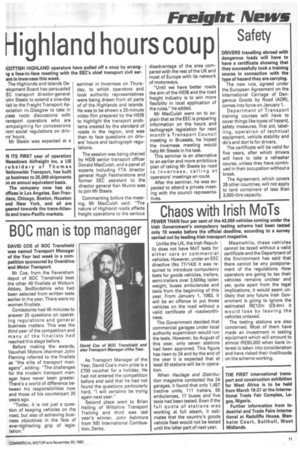Chaos with Irish MoTs
Page 7

If you've noticed an error in this article please click here to report it so we can fix it.
FEWER THAN four per cent of the 43,000 vehicles coming under the Irish Government's compulsory testing scheme had been tested only 10 weeks before the official deadline, according to a survey carried out by leading Irish transport magazine.
Unlike the UK, the Irish Republic does not have MoT tests for either cars or commercial vehicles. However, under an EEC directive (No 77/143) it was required to introduce compulsory tests for goods vehicles, trailers, semi-trailers over 3,500kg laden weight, buses ambulances and taxis from the beginning of this year. From January 1, 1983, it will be an offence to put these vehicles on the road without a valid certificate of roadworthiness.
The Government decided that commercial garages under local authority supervision would run the tests. However, by August of this year, only seven stations had been approved. This figure has risen to 24 and by the end of the year it is expected that at least 30 stations will be in operation.
When Haulage and Distribution magazine contacted the 24 garages, it found that only 1,457 tractive units, 111 trailers, 55 ambulances, 17 buses and five taxis had been tested. Even if the full quota of stations was working at full steam, it estimates that the country's goods vehicle fleet would not be tested until the latter part of next year.
Meanwhile, these vehicles cannot be taxed without a valid certificate and the Department of the Environment has said that there cannot be any postponement of the regulations. How operators are going to tax their vehicles remains unclear and yet, quite apart from the legal implications, it would seem unlikely that any future Irish Government is going to ignore the estimated IRE12m (£9.4m) it would lose by leaving the vehicles untaxed.
The testing stations are also concerned. Most of them have made an investment in testing equipment which will amount to almost 1R£60,000 when bank interest is taken into consideration and have risked their livelihoods on the scheme working.












































